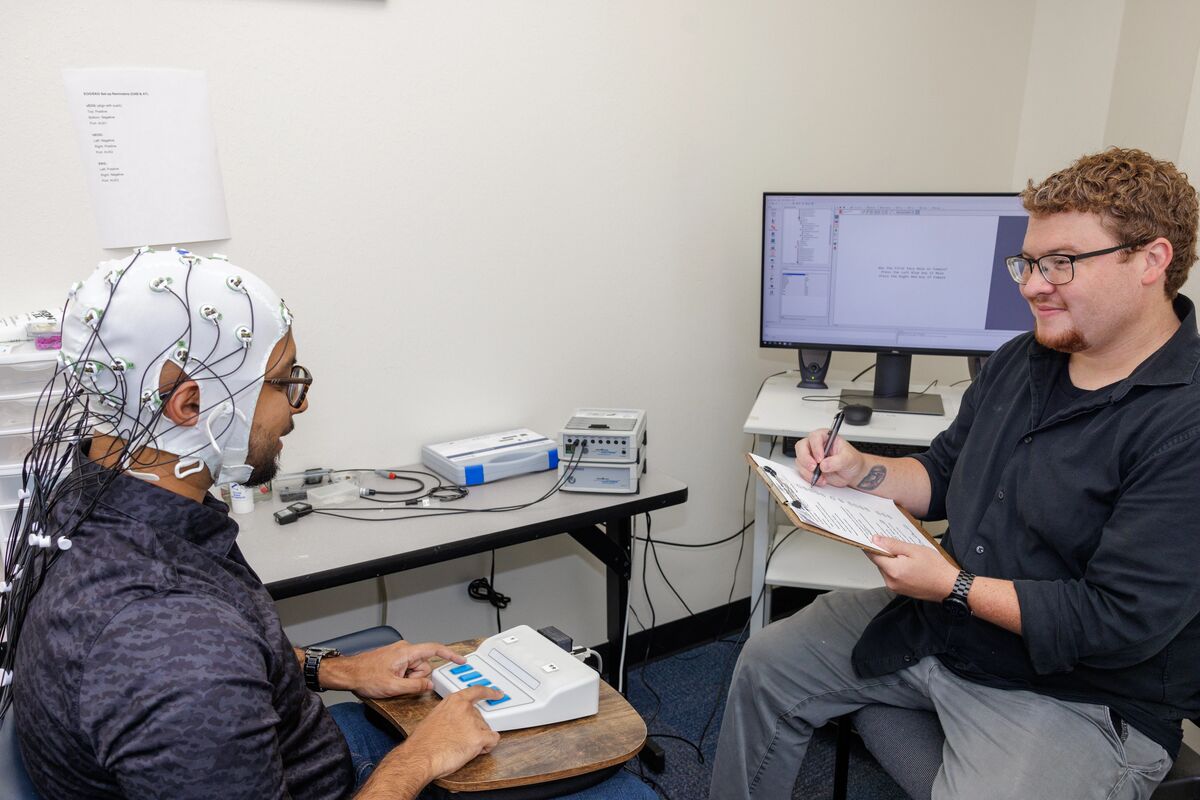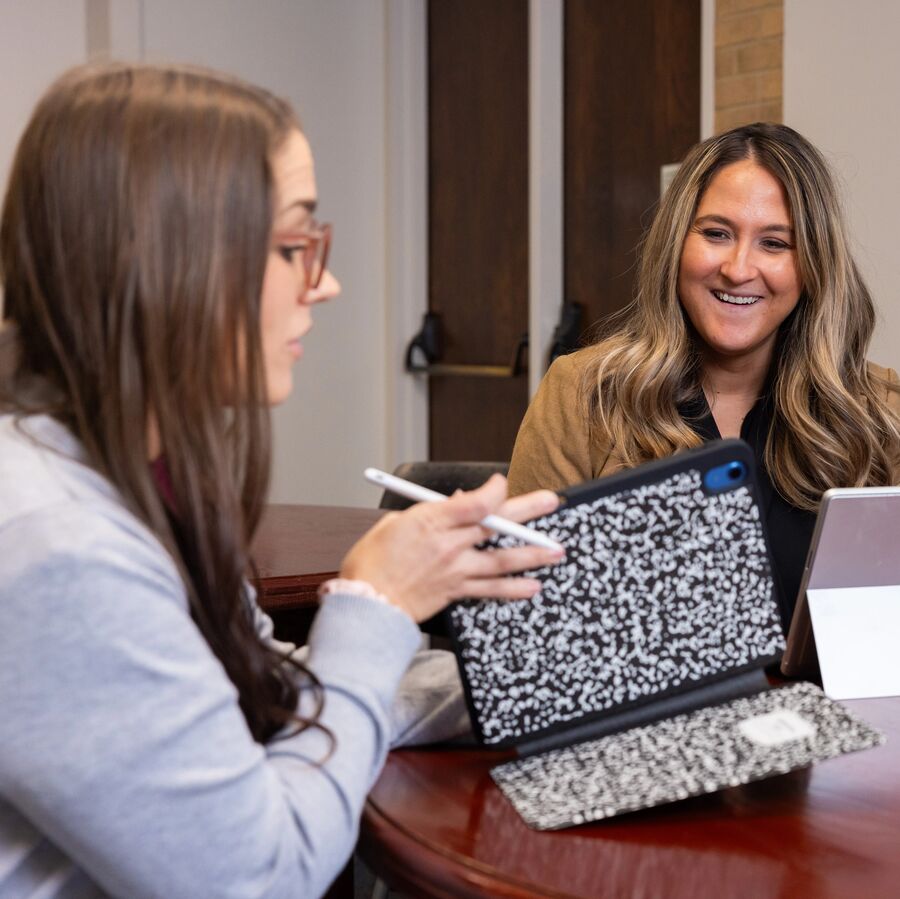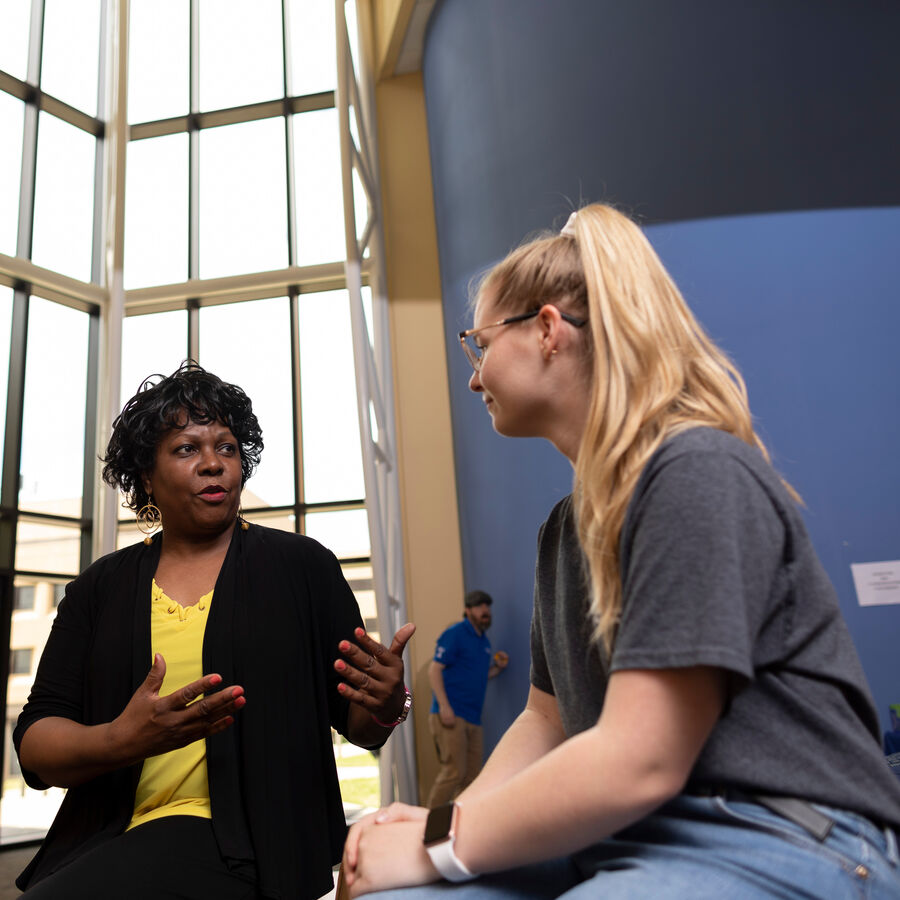
PhD in Clinical Psychology
Serve the Underserved as a Mental Health Professional
Certain demographics face barriers when attempting to access mental health services. The University of Texas at Tyler’s PhD in Clinical Psychology trains you to provide expert care to underserved populations in East Texas and beyond. Become a practitioner who is not only equipped to assist a wide range of individuals but also provides evidence-based, accessible and equitable treatment to all you serve.
Toward this goal, you’ll integrate research and practice as you master interviewing, therapy and assessment skills that will help you excel in any clinical setting. The program also provides training in the science of psychology in a matched-mentorship program. Nationally-recognized faculty will supervise both your research and counseling work to help you grow and thrive as a professional ready to provide vital care in medical, clinical and more settings. The PhD in Clinical Psychology is a dissertation-based program involving four years of on-campus study and a one-year doctoral internship, plus hands-on clinical experience beginning your second year.
Why Earn a PhD in Clinical Psychology at UT Tyler?
At UT Tyler, you’ll find a program uniquely focused on mental health for underserved populations. You’ll start to understand how to better assist veterans, rural residents and seniors. Following your completion of the program, you’ll be ready to step into a unique role and offer help where it is needed most — and where jobs are in high demand.
When you do so, you’ll have confidence knowing you’re prepared for the challenges ahead. In our program, you’ll experience:
- Comprehensive training: Master theory and practice. Our five-year residential program gives you a strong foundation in research, along with abundant practice in assessment and therapy. Explore all faculty research areas.
- In-demand specialization: Get equipped to meet growing needs for rural mental health, geropsychology and care for veterans.
- Support: Earn a UT-caliber degree on a smaller campus with a strong network of support within the department.
- Experiential learning: Develop interview, therapy and assessment skills in our on-campus clinic in your second year. Then, deepen your learning with off-campus clinical experience, culminating in a 12-month internship. Learn more about the program’s practicum component.
- Ready for licensure: When you graduate, you will have satisfied the educational requirements to become a Licensed Psychologist in Texas.
- World-class faculty: Learn from faculty who are practicing therapists, skilled teachers, active scholars and innovative researchers with externally funded research projects. They are devoted to your success and ready to mentor you in your professional growth.
- Affordable: Focus on your studies with a generous financial aid package that is among the best in the state.
What You’ll Learn
UT Tyler’s PhD in Clinical Psychology prepares you for practice as a licensed psychologist. The full-time, five-year program includes four years on campus and an off-site doctoral internship year.
The program balances the discipline’s theoretical and practical sides while emphasizing the importance of investing in underserved communities. You will receive a thorough grounding in advanced psychology topics and undertake independent research as you write a thesis and dissertation. You will also gain an abundance of hands-on experience in patient testing, diagnosis and treatment.
Based on guidance from the American Psychological Association, the program’s three emphasis areas reflect the projected demand for mental health services in East Texas over the next 10 to 15 years:
- Rural mental health: Prepare to work with populations experiencing the greatest need for services. Students receive training on providing tele-mental health services.
- Veterans and active duty military: Serve the specific mental health needs of military veterans, service members and their families.
- Geropsychological care: As the number of adults age 65 and older continues to increase, meet the growing demand for age-specific mental health services.
When you complete the program, you will be:
- Trained as a scientist-practitioner who has expansive knowledge of the scientific and behavioral foundations of psychology.
- Capable of developing, conducting and reporting research knowledge through your own program of independent research.
- Competent to assess, diagnose and treat psychological disorders using evidence-based practices.
- Trained in ethics and professional issues related to clinical practice and research.
- Equipped with clinical and research training to better support underserved populations, such as the elderly, rural communities and veterans as well as active-duty service members.
See Full Degree Requirements for the PhD in Clinical Psychology
Visit the Department of Psychology & Counseling
What Can You Do With a PhD in Clinical Psychology?
Following licensure, you’ll be qualified to offer expert help as a licensed clinical psychologist to those who are struggling with mental and emotional problems. With an aging population
and increased awareness of mental health issues specific to veterans and rural communities,
you’ll meet these pressing needs in clinical settings ranging from hospitals to private
practices to mental health centers across East Texas.
Your PhD will also open the door to research-based positions where you can help move
our understanding of psychology forward. You might serve as a professor at a university
or as a research psychologist at a government or private research institution.
How to Apply
The PhD in Clinical Psychology is designed for students who have at least some preparation in psychology. The strongest applicants will have 12 or more credits in the discipline, including coursework in statistics, research methods, history and systems of psychology and abnormal psychology. In some cases, students may be admitted without this prior coursework but will be required to complete these courses during the program. You must have an overall GPA of at least 3.0 in prior coursework.
Your application requires the following:
- Complete the online application.
- Official transcripts for all prior college- or graduate-level work, submitted to the Office of Graduate Admissions.
- Department Information Sheet.
- A statement of purpose. Submit electronically along with the department information sheet using the link above.
- Three letters of recommendation. Use our online system to request these from those who have agreed to write them for you.
- Curriculum vitae/résumé. Please send to gradadmissions@uttyler.edu.
Admitted students must complete a background check prior to enrollment.
As a doctoral student in clinical psychology at UT Tyler, you’ll receive generous financial support so you can focus on your studies.
Sources of support can include scholarships and assistantships. If funded, you will receive a four-year scholarship and a 50% tuition reduction. Assistantships are based on service of 20 hours per week and are intended to be renewable for up to four years, pending satisfactory performance.
While we can’t guarantee that you will receive funding, we have been able to provide full support to every student in the program since its inception.
Learn More About Financial Support for PhD in Clinical Psychology Students
December 1
Application deadline for all students to begin the following fall.
October 1
The Free Application for Federal Student Aid (FAFSA®) opens for the upcoming academic year.
Meet a Professor

Explore Related Programs
Next Steps
Your future starts here. Make an impact among the underserved with a PhD in Clinical Psychology from UT Tyler.


